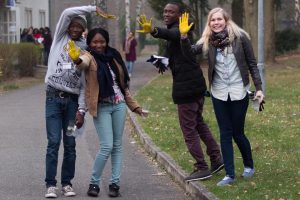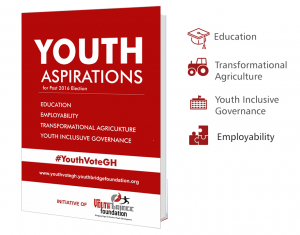We, Youth Bridge Foundation (YBF), recall our 11th May and 13th September 2016 press statements in which we expressed concern about the neglect of the youth in the political and electoral processes and called for improved engagements. Less than 40hours to the December 7, 2016 elections, Ghana risks low voter turn-out due to apathy.
A recent study and follow up interviews of some tertiary education students from the University of Cape Coast, Kwame Nkrumah University of Science and Technology and University of Ghana who was conveniently sampled on their attitudes and concerns towards the 2016 elections show that young people are generally detached from the political and electoral process. The results, as published by the Foundation on December 1, 2016, indicated that 53.2% of the respondents planned to vote in the upcoming election. However, a quite significant number of students (43.8%) has decided not to vote on December 7, 2016. The study in Ghana shows that students generally distrust the political system and processes
Noting that about 60% of the registered voter population shall be youth (aged 18 to 35 years), we are deeply disturbed by the continued neglect of this important constituents as important stakeholders in the electoral and political processes.
Action Call
In this regard, the Youth Bridge Foundation is calling on:
1. The Electoral Commission (EC) to be open, transparent and increase citizens’ engagement in the run to Wednesday’s polls and during the election process.
2. The EC to engage the youth and increase public dialogue through frequent press engagements to build greater trust in the electoral outcome.
3. The EC to openly instil confidence in the electoral process by coming out to assure the public of its objective conduct of this election.
4. Political parties should tone down on language that may engender mistrust of the EC. Such misinformation may lead to more mistrust, apathy and also make the youth vulnerable to negative political influence in terms of heightened political tension, violence and social unrest.
5. Political parties to actively mobilize young people to vote on December 7.
6. The media and civil society organizations to sustain coordinated youth-friendly educational programmes to demystify electoral jargons.
7. Political parties to be open to embrace recommendations and make room for adaptation after their manifestos have been reviewed by the citizenry.
Conclusion
YBF make these calls in the spurt of advancing youth-inclusive governance and assert that it is in the interest of Ghana to bring the youth along such important national exercises since the development of an informed citizenry, empowered with knowledge who are not susceptible to misleading must be prioritized.
Seth Oteng
Executive Director
Cell.: 024-322 9505



